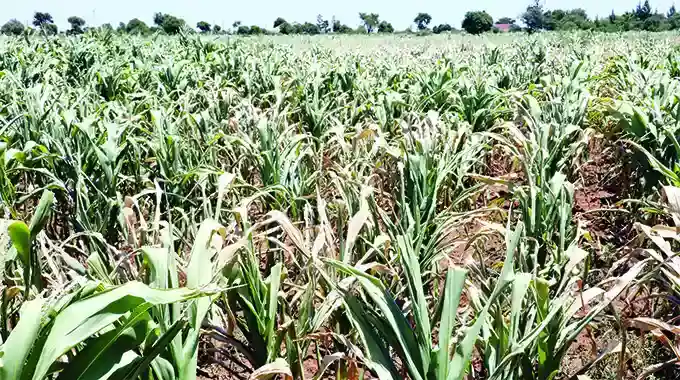
THIS year's summer season witnessed diverse and contentious rainfall patterns, which are largely attributed to El Niño-induced droughts that have disproportionately affected smallholder farmers.
In early April, government acknowledged the necessity for assistance, as it designated the prevailing drought a state of disaster and estimated that approximately US$2 billion will be required to provide humanitarian aid.
As the current wild season is almost on its periphery, ahead of us is yet another exciting winter season for winter cropping to which participating farmers are currently gearing up.
Winter cropping consists of cultivating crops tolerant to sub-zero or near-freezing temperatures for their growth and development cycle and requires considerably lower temperatures to initiate their reproductive phase, a phenomenon known as vernalization in grains. In Zimbabwe, winter crops that are predominantly cultivated include wheat, barley and oats as grains and diverse horticultural crops.
Among these, wheat is the most significant cultivated winter crop in Zimbabwe. In fact, wheat is the second most prominent “grain crop” after maize, while it is the third most prominent crop in general, after maize and tobacco in Zimbabwe. Its significance alludes to the ever-increasing demand for flour-made foods, such as bread, biscuits and breakfast cereals. Zimbabwe requires approximately 350 000 tonnes of wheat annually to sustain itself, which is difficult to achieve. Nonetheless, the 2022/23 season became a historical breakthrough when this target was surpassed, with much credit going to the government for its pragmatic investment in this crop and the agricultural sector.
Unfortunately, unlike other global regions with a Mediterranean climate, such as the Western Coast of South Africa, which receives winter rainfall, Zimbabwe’s winter season is exclusively characterised by limited to no rainfall. Thus, winter wheat farming in Zimbabwe is entirely based on irrigation, which, in turn, systematically excludes numerous farmers who rely on dryland farming. In other words, the major ticket for winter wheat farming in Zimbabwe is the availability of irrigation facilities, which tend to favour commercial farmers while leaving out smallholder farmers. In this regard, winter farming may not necessarily underperform to the extent of summer performance.
In general, in wheat farming and winter farming, sufficient preparation is essential because of the instant switch from summer to winter. Unlike summer crops, which have several planting dates throughout the season, wheat is highly selective on planting dates and requires early planting. In Zimbabwe, recommended early planting dates for wheat range from mid-April to mid-May, which reduces the two major risks of missing cold temperatures at the vernalisation stage and the coincidence of summer rains during harvesting.
Additionally, in some cases, the wheat planting window may coincide with the harvesting of summer crops, which might be laborious for farmers. Thus, it is imperative for farmers to take note of proper preparations and here we highlight some tips.
- Mavhunga puts DeMbare into Chibuku quarterfinals
- Bulls to charge into Zimbabwe gold stocks
- Ndiraya concerned as goals dry up
- Letters: How solar power is transforming African farms
Keep Reading
- Financial preparedness: As farming is a business that requires extreme capital costs, financing is a significant aspect. Farmers should ensure the availability of their financing and funding before beginning any activity, which they normally source from contractors, banks, the government, etc.
They should also ensure that all previous loans and debts are cleared. Self-financing can be complicated because of the large investment demand, particularly on a commercial scale.
- Machinery servicing: Farmers should inspect and ensure that all machinery, equipment and implements are serviced, cleaned and ready for work. This is crucial to eliminate unnecessary breakdowns during the season, which may hinder progress and consequently reduce the yield. In addition, farmers should upgrade to modern automated equipment that is more efficient and precise.
- Water availability and irrigation: Water availability and irrigation are critical aspects of winter wheat production because the season is categorised as low to no rainfall. Farmers should ensure that enough water is available to sustain the seasonal crop demand and increase the water reserves where possible, as well as contact water quality tests. The high rainfall received during the 2022/23 season and the low rainfall received from the previous summer season should have been sufficient to fill most dams and other reservoirs. Farmers should also ensure that all irrigation equipment is in order and works properly. Where possible, accessories such as pipes, nozzles and engines should be replaced.
- Inputs: All inputs should be in place before the beginning of the season in all required amounts. These include seeds, fertilisers, chemicals for weeds, pest and disease control and fuels. Sometimes, these inputs are provided by contractors or farmers are given cash and source them on their own. Delays may occur, especially when provided inputs, and it is the farmer’s responsibility to conduct follow-ups to ensure that their inputs are all in place.
- Soil testing: Farmers should perform soil testing to verify and evaluate their soil conditions and ensure informed fertiliser management decisions. Soil testing assists farmers in understanding which nutrients and the amount of nutrients available. In addition, other soil characteristics, such as salinity and acidity, can be determined to ensure that they are moderate. Many farmers tend to be reluctant to conduct soil testing, which intimately affects fertiliser management.
- Land preparation: This is the initial stage on the ground, which consists of clearing, weeding, tilling, harrowing and levelling. Land preparation is important for other aspects, such as drainage, germination, soil depth and organic matter management. Appropriate tilling should be performed with proper tillage equipment, depending on the type of tillage. Farmers are recommended to practise conservation tillage, which complements sustainable farming.
- Extension services: Extension officers play a critical role in advising farmers to make informed decisions regarding their farming activities. Farmers should engage extension officers and agronomists from the preparation stage to familiarise themselves from the beginning and advise them to make the best decisions. This will also require engaging a specific extension officer or agronomist who specialises in wheat.
- Programme planning: Before the beginning of any activity, farmers should note all activities and procedures they will carry out during the whole season together with their dates. This includes land preparation, planting and harvesting, fertiliser and chemical application for weeding, disease and pest control and irrigation scheduling.
Proper preparation prevents poor performance. With proper preparation, wheat farmers have a great chance of achieving their wheat yield potential during the rough dry season. This will be crucial to meet the country’s wheat output targets and a repeat of the 2022/23 season’s breakthrough, which will halt the continuous dependence on imported wheat because Zimbabwe has the capacity to produce its own.
- Hamond Motsi is a PhD student at the Faculty of Agrisciences, Stellenbosch University interested in sustainable agriculture and agricultural development in Africa. He holds an MSc in Agronomy (cum laude) from Stellenbosch University, BSc Hons in Crop Science, and BSc in Crop and Soil Science (cum laude), both from the University of Fort Hare. You can contact him at [email protected].











